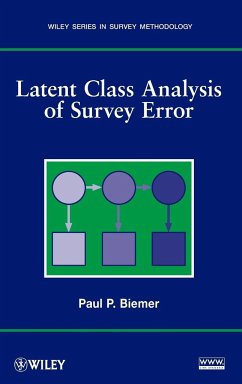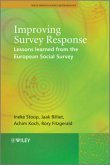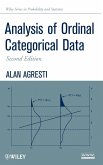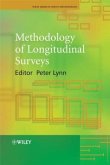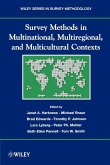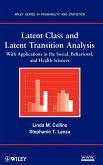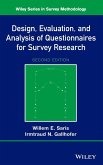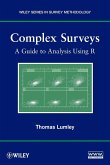Combining theoretical, methodological, and practical aspects, Latent Class Analysis of Survey Error successfully guides readers through the accurate interpretation of survey results for quality evaluation and improvement. This book is a comprehensive resource on the key statistical tools and techniques employed during the modeling and estimation of classification errors, featuring a special focus on both latent class analysis (LCA) techniques and models for categorical data from complex sample surveys.
Drawing from his extensive experience in the field of survey methodology, the author examines early models for survey measurement error and identifies their similarities and differences as well as their strengths and weaknesses. Subsequent chapters treat topics related to modeling, estimating, and reducing errors in surveys, including:
Measurement error modeling forcategorical data
The Hui-Walter model and othermethods for two indicators
The EM algorithm and its role in latentclass model parameter estimation
Latent class models for three ormore indicators
Techniques for interpretation of modelparameter estimates
Advanced topics in LCA, including sparse data, boundary values, unidentifiability, and local maxima
Special considerations for analyzing datafrom clustered and unequal probability samples with nonresponse
The current state of LCA and MLCA (multilevel latent class analysis), and an insightful discussion on areas for further research
Throughout the book, more than 100 real-world examples describe the presented methods in detail, and readers are guided through the use of lEM software to replicate the presented analyses. Appendices supply a primer on categorical data analysis, and a related Web site houses the lEM software.
Extensively class-tested to ensure an accessible presentation, Latent Class Analysis of Survey Error is an excellent book for courses on measurement error and survey methodology at the graduate level. The book also serves as a valuable reference for researchers and practitioners working in business, government, and the social sciences who develop, implement, or evaluate surveys.
Drawing from his extensive experience in the field of survey methodology, the author examines early models for survey measurement error and identifies their similarities and differences as well as their strengths and weaknesses. Subsequent chapters treat topics related to modeling, estimating, and reducing errors in surveys, including:
Measurement error modeling forcategorical data
The Hui-Walter model and othermethods for two indicators
The EM algorithm and its role in latentclass model parameter estimation
Latent class models for three ormore indicators
Techniques for interpretation of modelparameter estimates
Advanced topics in LCA, including sparse data, boundary values, unidentifiability, and local maxima
Special considerations for analyzing datafrom clustered and unequal probability samples with nonresponse
The current state of LCA and MLCA (multilevel latent class analysis), and an insightful discussion on areas for further research
Throughout the book, more than 100 real-world examples describe the presented methods in detail, and readers are guided through the use of lEM software to replicate the presented analyses. Appendices supply a primer on categorical data analysis, and a related Web site houses the lEM software.
Extensively class-tested to ensure an accessible presentation, Latent Class Analysis of Survey Error is an excellent book for courses on measurement error and survey methodology at the graduate level. The book also serves as a valuable reference for researchers and practitioners working in business, government, and the social sciences who develop, implement, or evaluate surveys.
"Biemer (statistics, RTI International and survey research and development, U. of North Carolina at Chapel Hill) provides a comprehensive source on the primary statistical tools and techniques used in the modeling and estimation of classification errors, with a particular focus on latent class techniques and models for categorical data from complex sample surveys . . . the book would be useful as a text for graduate level courses in measurement error and survey methodology, as well as a reference for researchers and professionals in business, government, and social sciences who are responsible for developing, implementing, or evaluating surveys." (Booknews, 1 April 2011)
"By combining theoretical, methodological and practical aspects of estimating classification error, the book provides a guide for the practitioner as well as a text for the student of survey error evaluation". (RTI International, 18 January 2011)
"By combining theoretical, methodological and practical aspects of estimating classification error, the book provides a guide for the practitioner as well as a text for the student of survey error evaluation". (RTI International, 18 January 2011)

